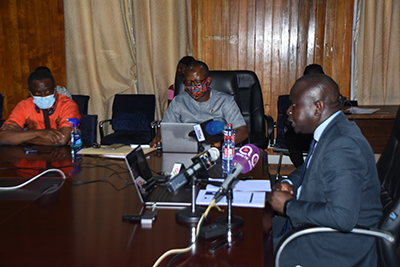
About 22 million Ghanaians out of the projected 31 million population have experienced reduction in income since March 16, when the country introduced its restrictions on the coronavirus disease, the Ghana Statistical Service (GSS) has revealed.
According to Government Statistician, Professor Samuel Kobina Annim, the figure constituted 77.4 per cent households in Ghana who experienced a decline in income, as a result of restrictions.
He was speaking yesterday at the maiden edition of a series of briefs by the GSS known as the COVID-19 Households and Jobs Tracker Survey Report in Accra yesterday.
The restrictions, he said, led to every seven out of 10 employees not working in the previous seven days, of which a greater number indicated was as a result of COVID-19 safety concerns.
He added that, while some individuals had not worked in the last seven days because of suspension of work, others had not worked because of the reduction in staff capacity of organisations.
Also, some individuals remarked ascribed retirement and seasonal job, as the reason for not working in the previous seven days.
“Seven out of 10 of respondents indicated that they had not worked in the previous seven days; of these respondents, 36 per cent did not work due to COVID-19 related concerns,” Professor Annim said.
“A further 20.4 per cent mentioned COVID-19 work suspension as the reason for not working, while 2.4 per cent attributed it to reduction in staff due to less business, with the rest having other reasons for not working (retirement, seasonal workers),” he added.
According to the GSS, nearly three-quarters of households indicated that they could easily access staple foods while 15 per cent of households reported not to be able to buy at least one staple food in the seven days prior to being interviewed due to high prices and financial constraints.
Professor Annim also mentioned that a fifth of households did not have regular access to water, 8.6 per cent of household could not buy medicine when they needed to and 6.1per cent of households tried accessing but were unable to.
Pertaining education Professor Annim mentioned that students were engaged in variety of learning activities primarily through watching educational TV programmes with their challenge being the lack of ICT tools.
“Sixty-five per cent of basic school students and 72 per cent of Senior High School (SHS) students were still engaged in different types of learning activities; the most common of these activities was watching educational TV programmes,” he said.
However, he noted that, there were challenges in learning while school was not in session, with the main difficulty in the learning process for the basic and SHS being, “lack of access tools like computers or phones,” Professor Annim noted.
Regardless of the reduction in income in households, Professor Annim explained that, less than 10 per cent of households interviewed had received at least one form of assistance.
He stated that, the most common remedy people opted for, under the effects of the COVID-19 was to reduce food consumption, reduce non-food consumption and also rely on savings.
According to Professor Annim parents expressed that; they were often angered by their children, since the closure of schools, making them stay home every day.
The report which stemmed from data collected by the GSS data in a nationally representative telephone survey to gauge effects of COVID-19 on households and jobs in Ghana from June 10 to June 25, 2020, also revealed that, majority of Ghanaians had heard of the COVID-19.
BY FRANCIS NTOW & ABIGAIL N. E. ARTHUR







